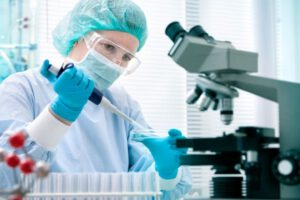
Sperm donor genetic screening – genetic testing for sperm donors
Sperm donation has become a popular option for women who wish to be single mothers by choice.
To prevent genetic diseases, sperm donors undergo comprehensive screening tests that can help ensure no genetic risks of inheriting genetic disorders. Moreover, if the mother-to-be has a genetic disorder or is a carrier of a genetic mutation, testing donors is highly important to prevent passing on the same mutation to the fetus.
In addition to deciding on factors such as height, eye color and hair color of their donor, women interested in sperm donations should also seek genetic counselling to make sure the chosen sperm donor meets all required genetic criteria and ensure that every effort is made to prevent the fetus from inheriting genetic diseases.
Genetic diseases can be inherited from both parents
Genetic diseases are usually hereditary, which means they are inherited from the parents. Thanks to advancements in genetics passing down many of these diseases can now be prevented.
Normally, genetic material contains two copies of each gene, one inherited from each parent.
Some genetic disorders are characterized by an autosomal dominant inheritance pattern, this means that one copy of the defected gene is enough for the child to develop the disease. Alternately, autosomal recessive diseases require two copies of the defected gene for the disorder to develop.
A carrier is a person who has one healthy copy and one defected copy of a gene associated with a genetic disorder. Carriers do not develop the disease themselves and do not show symptoms, they may be unaware that they are carriers and discover this by chance. Genetic screening is extremely important when using sperm donations, since it helps women ensure carrier donors do not pass on any defected genes.
When the woman receiving the donation is herself a carrier of a genetic disease, the sperm donor must also be screened to ensure he is not a carrier of the same disease.
Genetic testing for sperm donors
Like prenatal screening in couples, in which the father does not always undergo genetic testing, sperm donors also do not always undergo screening procedures. Many sperm banks perform genetic screening tests on their donors, according to their medical history and descent. However, the tests performed on sperm donors vary between sperm banks.
In the United States, screening is regulated by the CDC and FDA, and requires documenting the donor’s medical history, blood tests for infectious diseases, genetic carrier tests for diseases such as Thalassemia, cystic fibrosis and sickle cell disease, and HIV risk assessment.
European sperm banks screen for various hereditary diseases such as cystic fibrosis, SMA, sickle cell disease, thalassemia, Tay-Sachs and more, according to ethnic descent.
The tests performed are usually similar to those included in preconception screening and includes a series of tests for detecting defected gene carriers.
It is important to note that in many sperm banks, donations from carriers are not rejected, but the recipient women are informed about the donor being a carrier. In these cases, recipients are tested and if they are not carriers of the same diseases, may receive the donation.
Comprehensive donor testing
Genetic screening tests are performed on sperm donors to determine if they are carriers of genetic disorders. This is usually done when the recipient is diagnosed as a carrier of a certain genetic disease herself, to choose the donor accordingly and ensure the fetus’ health. Donors to carrier recipients are screened to make sure they are not carrier of the same gene-mutation.
PGD – Preimplantation genetic diagnosis
When the sperm donor’s identity is known to the recipient woman, she can choose to undergo a process called Preimplantation genetic diagnosis, or PGD, performed during in vitro fertilization (IVF). This procedure is relevant in cases where both donor and recipient have a certain genetic disorder. It is done to ensure this disorder is not passed down to the fetus. After egg fertilization, a small sample of genetic material is tested in a laboratory. Only when the embryo is found to be healthy, will it be implanted in the uterus. This helps ensure the baby’s health.

